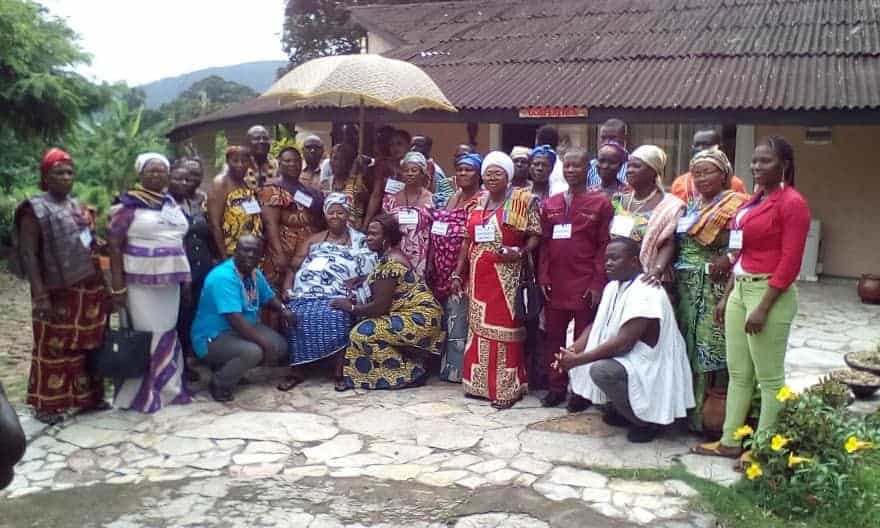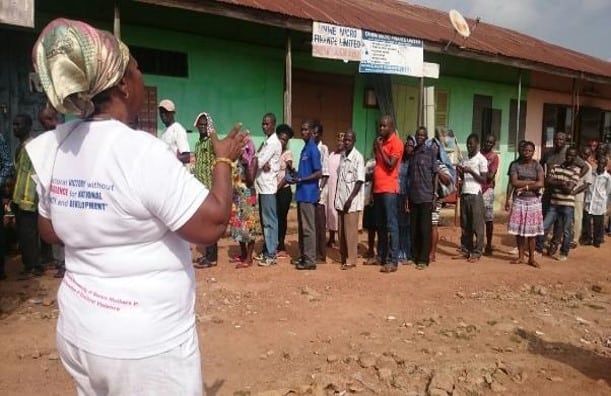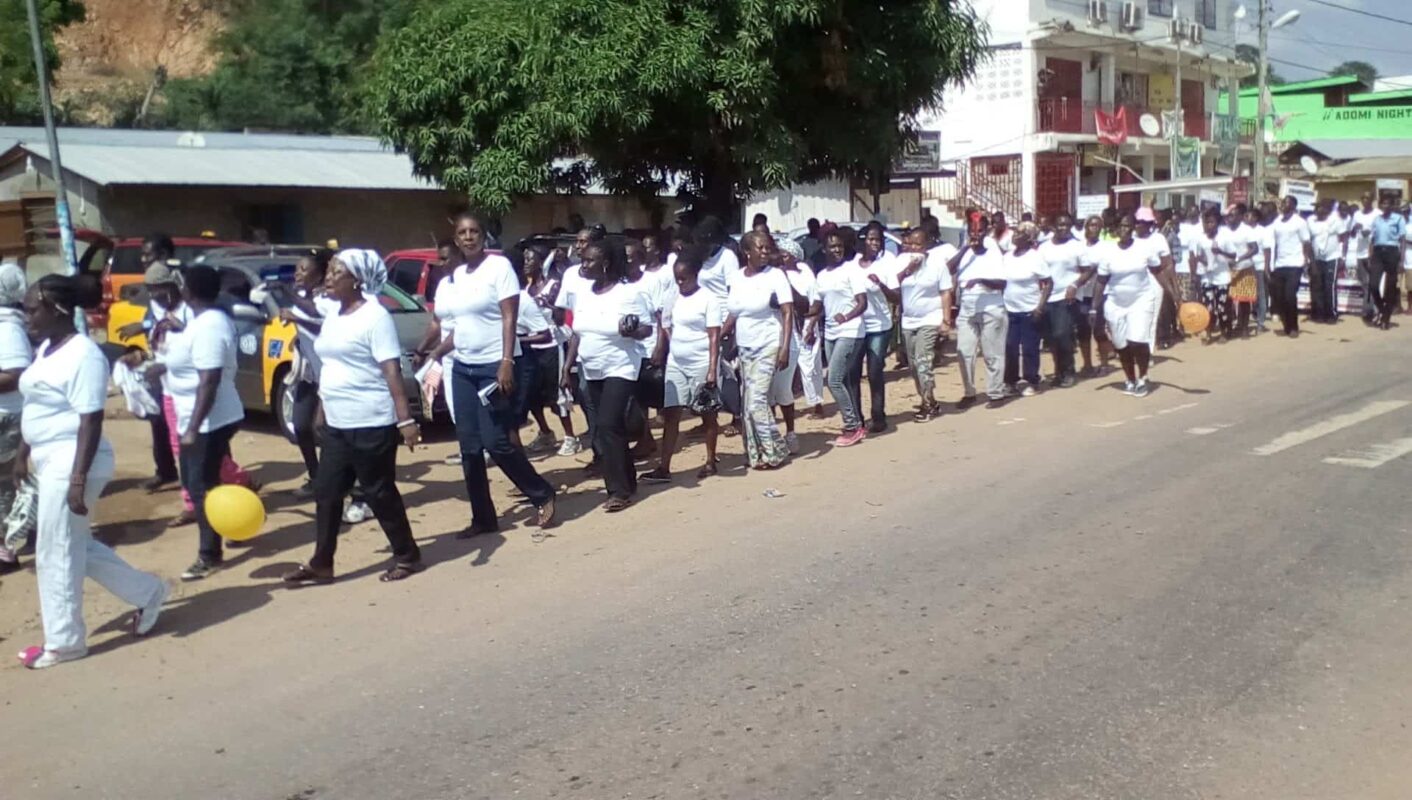USAID’s REWARD trained women to be leaders in mitigating electoral violence

From training female political candidates in Niger to diffusing electoral violence through women-led campaigns in Sierra Leone, USAID Reagindo a dados de aviso e resposta antecipados has brought a nuanced approach to elevating women and promoting equality. In doing this, the five-year project relied on symbiotic relationships with local partners dedicated to reducing electoral violence through involving women and changing the narrative around women’s political participation in West Africa.
The Akwamu Traditional Council and Fambul Tok International’s Peace Mothers are two organizations that came alongside REWARD to incorporate women in peace building initiatives. Em 2017, REWARD trained them on the techniques and best practices to achieve these electoral goals. Hoje, they reflect on lessons learned, impact and where they are now.
When traditional authorities are partners, not beneficiaries
Facing an upcoming election season in 2017, a time typically marked by violence, crime and heightened tension, the Akwamu Traditional Council in the Eastern region of Ghana received a grant from USAID REWARD to train an association of “queen mothers” to identify and prevent violence, lead anti-violence campaigns, facilitate peaceful voting and organize awareness meetings.
“During elections it’s women and children that suffer more when violence breaks out,” says Nancy Otu, the primary liaison between USAID REWARD and the Akwamu Traditional Council. "Então, it’s important that around that time people should be educated on the need to refrain from such acts and not just follow political hate or try to use the youth to engage in social violence during this political era.”
Em Gana, traditional governance structures still influence community life. Queen mothers are the wives or sisters of village chiefs and are part of this traditional structure, but they usually don’t have formal authority. Giving them a framework to organize enabled the women to share ideas and create actionable plans that responded to their communities’ security issues around voting.

Representing 20 communities in the Asuogyaman district, the queen mothers also learned about citizens’ rights and responsibilities, and the regulations surrounding the electoral process. REWARD program worked with them to use this knowledge to inform effective strategies aimed at keeping the peace, and to train other women in their villages.
“We spend more time with our children, so we understand what the youth go through and we could have several ways of explaining to them the need to refrain from people who could come and deceive them to engage in any political violence activities,” said Nana Adwoa Oduraa III, the Apeguso Queen Mother.
Otu estimates that the project directly reached 1,800 people in the region through the women’s outreach events, and indirectly reached 50,000 people through the radio and TV broadcasting campaigns they produced with USAID REWARD. She said that empowering the queen mothers, known and respected by people in their villages, was the most effective way to communicate about the issue of electoral violence.
“It worked because it was an opportunity for the queen mothers also to talk directly to their own constituents,” says Otu. “These people in these communities and villages respect these traditional authorities, so when they realize that one of their own is telling them do this or don’t do this or is educating them on the good things that need to be done during elections, they understand it more. They take it better than somebody from outside coming in to tell them [what to do.]”
“Women think community”
The issues around election cycles the queen mothers face in Ghana are reflective of challenges across the region. Since its decade-long civil war ended in 2002, Sierra Leone has suffered from persistent violence and corruption at the community level, which manifests in protests, vandalism, bribes and strife stirred up by political opponents.
Jon Caulker, the founder and director of the human rights organization Fambul Tok, says that the country’s social fabric remains torn.
“And as a nation, we used to be one big family. Your mother is my mother. Your child is my child,”ele diz. “It was my mission to find out what went wrong.”
After working on a national Truth and Reconciliation Council in the early 2000s, he founded Fambul Tok to lead peace efforts and development projects at the community level, an approach he believed was missing from national initiatives. His organization began leading women’s circles for survivors of sexual violence to share their stories and seek healing. Called “Peace Mothers,” these groups grew to become a cornerstone of Fambul Tok.
“We’ve realized that women think community,”ele diz.
With USAID REWARD’s grant, 160 of these women community leaders received training and capacity building to engage in peaceful elections and resolve community disputes in 16 chiefdoms in Bombali, Kailahun, Kono, and Pujehun districts. REWARD’s strategy aligned with one of Fambul Tok’s core beliefs: that sustainable growth comes from the inside out.
“We have the answers in our communities,”ele diz. “Create a space for us to step into our true self… So that was what was supported. The opportunity for women to become peace champions in their communities and to lead a non-violence campaign within that community.”
With USAID REWARD’s support, the Peace Mothers convened more than 270 meetings where youth, mulheres, and traditional leaders gathered to discuss approaches to prevent violence before and after the elections and to dispel misinformation.
They also organized weekly radio broadcast PSAs and on-air expert discussions with four community radio stations, as well as distributed posters, t-shirts and brochures with the slogan: “Elections must not divide us. We are one family.”
Beyond the election cycle
“One of the most important lessons learned as an organization is that elections don’t just end the day the results are announced,” says Caulker.
Caulker’s statement has dual meaning. On one hand, he referred to the need for programs to address maintaining peace after voting results are publicized. One the other hand, with both Fambul Tok and the Akwamu Traditional Council in Ghana, the training sessions and workshops were intended to have impact beyond the election cycle by leaving women with tools and knowledge with which to approach other development challenges.
Many of the queen mothers said that during the training they learned about some of the things that were worrying the youth in the community, which pushed them into election violence, such as poverty and the lack of services.
“We continue to engage the communities to sensitize and educate them on other developmental issues apart from elections,” said Nana Adwoa Oduraa III, Apeguso Queen Mother. “This also has shaped the way we deal with the youth anytime we want to engage in an activity or a program.”
Three years since the election campaigns organized with REWARD, Fambul Tok’s Peace Mothers are spreading awareness on COVID-19 through making and distributing soap and masks. Caulker echoed the value of elevating women through bringing them in as partners in projects that address their communities’ challenges.
“It also provides an opportunity for them to emerge as leaders within the communities,”ele diz. “Most times people don’t see women – I’m talking about rural women– as leaders.”

From local response to regional policy: CEDEAO
Changing perceptions, like Fambul Tok does through the Peace Mothers, is the beginning of much of the work related to engaging women in electoral security efforts. While the peacebuilding projects with the Akwamu Traditional Council and the Peace Mothers represented a hyper local approach to gender integration, REWARD’s partnership with Economic Community of West African States (CEDEAO) strengthened the organization’s approach to gender at a macro level.
When USAID REWARD started working with ECOWAS to strengthen its early warning data collection and analysis processes and its response planning, the project didn’t realize then that one of its biggest institutional legacies would be gender integration.
“ECOWAS took our early warning trainings on gender and wanted to run with it, developing a gender framework was their request,” says Leora Addison, Project Director at Creative. “Quando começamos, we wouldn’t see gender specific data in their reporting.”
Through a series of workshops, USAID REWARD highlighted the importance of integrating gender in early warning analysis and in planning response. Because gender shapes how people experience, perceive and participate in conflict, early warning and response systems are strengthened by having more robust data sets. This then leads to better tailored, specific responses at the local level.
“Women and youth are disproportionately affected by violence,” says Alimou Diallo, REWARD’s Chief of Party. “Recognizing this important reality has a major impact on the way conflict is managed.”
USAID REWARD also supported the ECOWAS Gender Integration in Early Warning Manual and its accompanying training modules, which offer guidance on gender integration through every step of the early warning process, including data collection, early warning analysis, report writing and in formulating recommendations. The Manual walks analysts through gender-related questions regarding a crisis, disaster, or conflict situation.
Field monitors surveyed after completing a workshop on gender integration reported being more sensitive to gender in their reporting as a result of the training, com 87 percent of field monitors taking gender into account in at least half of their reports, em comparação com apenas 58 percent prior to the training. More than half of these field monitors named gender as the key skill or concept from the training that they were applying.
These results point to the institutionalization of gender-specific programming in a key governing body in West Africa. USAID REWARD’s prioritization of women’s increasingly critical role in facilitating democratic processes comes back to the people at the forefront of building safer communities, bridging policy and local initiative, like the Akwamu Traditional Council.
These workshops “were the first time that the queen mothers had been gathered together to be trained on an issue relating to national policy,” says Otu.
As the project moved into a second phase of work, it hopes to continue fostering more “firsts” as women take on new roles in conflict prevention and mitigation, at the community and national levels, and across the West Africa region.